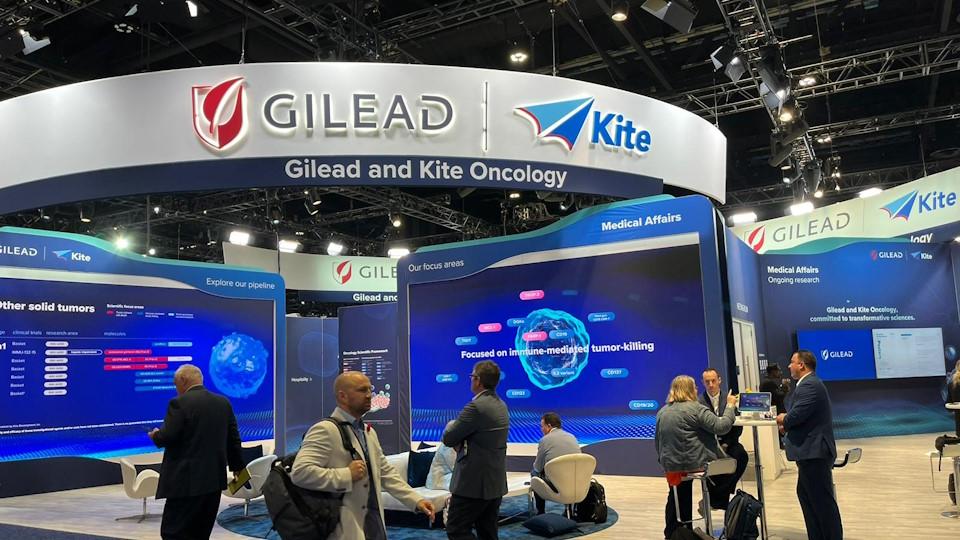ASCO: Gilead sifts lung cancer data for efficacy crumbs

Gilead Sciences’ bid to extend the uses of TROP2-directed Trodelvy into lung cancer currently rests on the results of its EVOKE-01 study, revealed for the first time at this year’s ASCO.
The company said earlier this year that the trial had missed its primary objective, failing to achieve a statistically significant extension in survival in patients with metastatic non-small cell lung cancer (NSCLC), previously treated with platinum-based chemotherapy and PD-1/PD-L1 inhibitor immunotherapy, compared to second-line standard docetaxel.
At ASCO, oncologists were able to get a look at the actual data, which showed a 16% reduction in the risk of death with Trodelvy (sacituzumab govitecan), with a median overall survival (OS) of 11.1 months compared to 9.8 months with docetaxel. The OS trend was consistent across both squamous and non-squamous patients, according to the data.
Despite that, Gilead had previously said it believed that the totality of evidence could throw a lifeline to Trodelvy in lung cancer, and it has highlighted an improvement in OS in a subgroup of patients whose tumours did not respond to their last immunotherapy-based treatment.
The difference in that group – which accounted for around two-thirds of the study population – was around 3.5 months, with a median OS of 11.8 months for Trodelvy and 8.3 months for docetaxel.
However, EVOKE-01 wasn’t powered to deliver a verdict on whether that 25% improvement was statistically significant, and the antibody-drug conjugate (ADC) was also linked to reduced OS in patients who responded to their last anti-PD-1/PD-L1 treatment.
Given that, it looks like the company will have a tough time convincing regulators to extend the label of Trodelvy from its current uses in locally advanced or metastatic breast and urothelial cancers into NSCLC, at least with the current dataset.
Last year, Gilead reported what it said were promising topline results from the EVOKE-02 study of Trodelvy in combination with MSD’s PD-1 inhibitor Keytruda (pembrolizumab) and chemo in patients with advanced or metastatic NSCLC without genomic alterations that make them candidates for targeted therapy.
It is also running the EVOKE-03 study of Trodelvy plus Keytruda versus Keytruda monotherapy for previously untreated patients with PD-L1-high metastatic NSCLC, giving it another potential shot on goal in lung cancer.
In the meantime, however, direct TROP2 competition is looming from AstraZeneca and Daiichi Sankyo’s ADC datopotamab deruxtecan (Dato-DXd), which was recently filed for approval in NSCLC – for non-squamous tumours only – as well as breast cancer.
Dato-DXd was also unable to achieve a significant improvement in OS in the TROPION-Lung01 trial but did improve progression-free survival (PFS) and AZ and Daiichi Sankyo are hoping for approval based on the whole dataset. PFS was a secondary endpoint in EVOKE-01 but Trodelvy was unable to show a benefit on that measure.
AZ and Daiichi Sankyo have also filed for approval of the drug in unresectable or metastatic HR-positive, HER2-negative breast cancer who have received prior systemic therapy based on the TROPION-Breast01 study, challenging Trodelvy in that indication, while Gilead’s ADC is also facing competition in breast cancer from the partners’ HER2-directed ADC Enhertu (trastuzumab deruxtecan) in triple-negative breast cancer (TNBC).
On top of that, Gilead reported just ahead of ASCO that Trodelvy had flunked the confirmatory TROPiCS-04 trial in bladder cancer, putting its accelerated approval in that indication under threat.
For now, it looks like Trodelvy may not be the force that Gilead is hoping for in its ongoing effort to make one-third of its revenues from cancer drugs in 2030.
Gilead’s chief medical officer, Merdad Parsey, said the company will be “investigating how these data may positively impact patients in the second-line setting.” The data have been simultaneously published in the Journal of Clinical Oncology.













